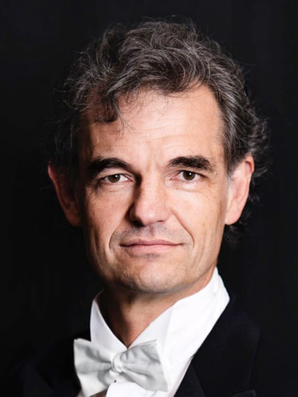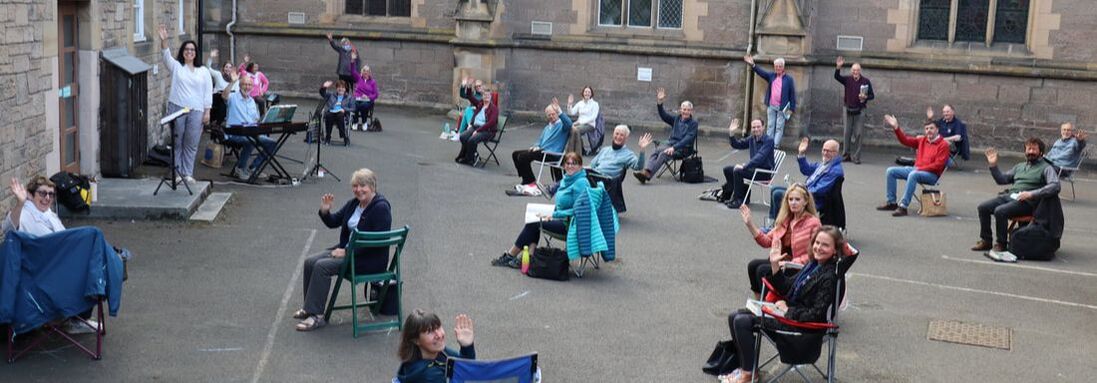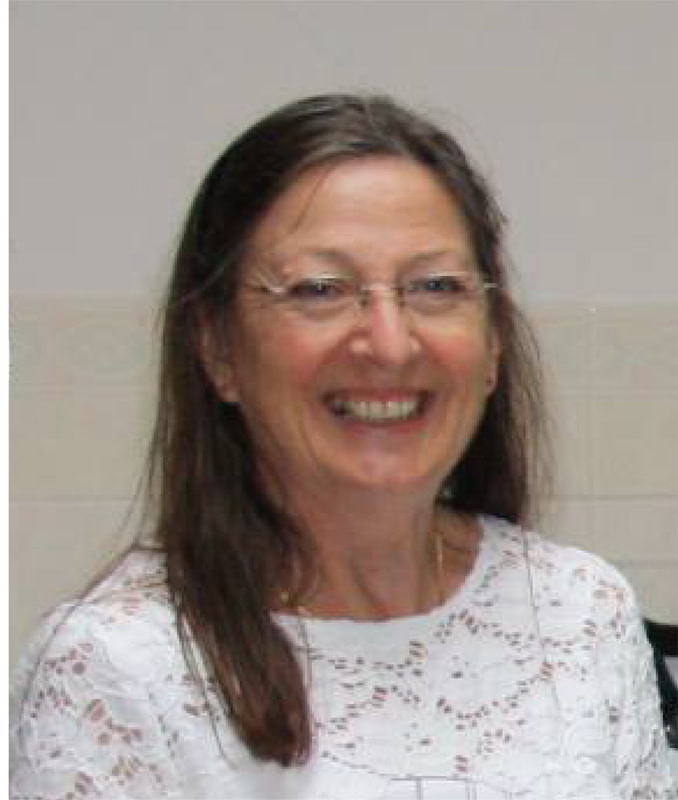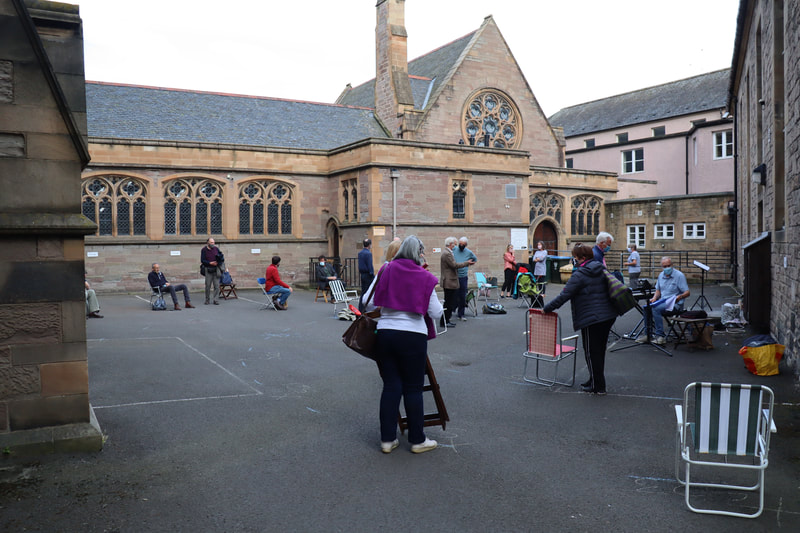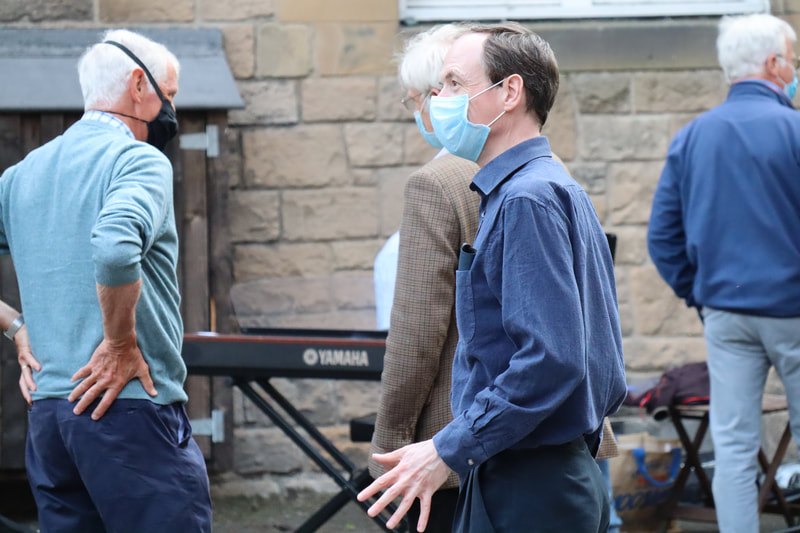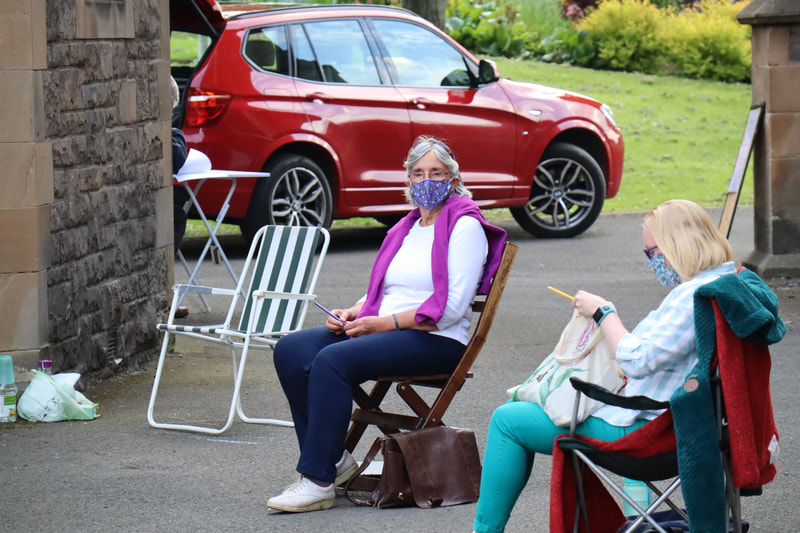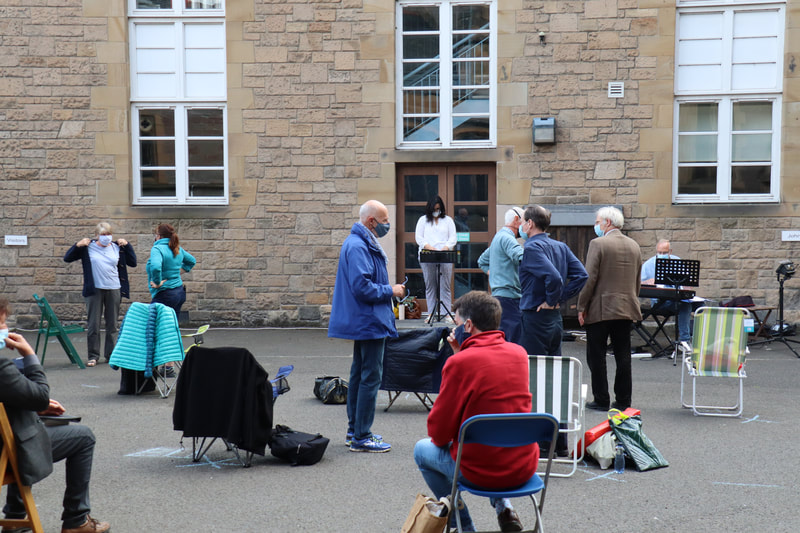Gloria
From the press review submitted to the Perthshire Advertiser by Ian Stuart-Hunter
Perth’s own chamber choir Chansons gave their December concert in the historic St John’s Kirk mixing a first half of mainly seasonal items with two major works by Haydn and Vivaldi.
Under conductor Areti Lymperopoulou they began joyously with two Mendelssohn pieces of rejoicing: first with pealing tones, next with expectation. Then Mary Went Through a Forest of Thorns by Stefan Claas, called in the programme ‘a personal friend of the choir’. This impressed in its honesty and storytelling.
Four English pieces with a Tudor style followed, two of the time (by Tallis), two 2oth century (Peter Warlock). With good diction and bass notes, then a brightness and a sense of wonder these are where Chansons excels.
They were good too at the tricky rhythms and disjunctions of Cecilia McDowall’s 1951 Of a Rose and gave a most moving performance of The Lamb by John Tavener. Sally Hunter set off Holst’s extended This Have I Done For My True Love with a confident solo, before the first half ended with Haydn’s Little Organ Mass of gentle, airily classical tread. We heard the finely sung Amens much sooner than we would have thought, due to the then practice of singing different lines concurrently… and confusingly! An enjoyable soloist in the was Colleen McNicoll, with solo organ Howard Duthie, in the Benedictus.
The small orchestra of the Haydn was enlarged and with an excellent trumpet and oboe, for Vivaldi’s famous Gloria RV589. Collen McNicoll was joined mellifluously by Sioned Gwen Davies, mezzo, in the Laudamus duet. From the cries of Gloria at the start, reprised with different words at the end Chansons were engaged and lively. Their fugues impressed. Sioned Gwen Davies was rhythmic and exciting in her solo aria.
Altogether an excellent and involving concert in a very different style than their Opera choruses planned for 2oth April 2024.
Ian Stuart-Hunter
From the press review submitted to the Perthshire Advertiser by Ian Stuart-Hunter
Perth’s own chamber choir Chansons gave their December concert in the historic St John’s Kirk mixing a first half of mainly seasonal items with two major works by Haydn and Vivaldi.
Under conductor Areti Lymperopoulou they began joyously with two Mendelssohn pieces of rejoicing: first with pealing tones, next with expectation. Then Mary Went Through a Forest of Thorns by Stefan Claas, called in the programme ‘a personal friend of the choir’. This impressed in its honesty and storytelling.
Four English pieces with a Tudor style followed, two of the time (by Tallis), two 2oth century (Peter Warlock). With good diction and bass notes, then a brightness and a sense of wonder these are where Chansons excels.
They were good too at the tricky rhythms and disjunctions of Cecilia McDowall’s 1951 Of a Rose and gave a most moving performance of The Lamb by John Tavener. Sally Hunter set off Holst’s extended This Have I Done For My True Love with a confident solo, before the first half ended with Haydn’s Little Organ Mass of gentle, airily classical tread. We heard the finely sung Amens much sooner than we would have thought, due to the then practice of singing different lines concurrently… and confusingly! An enjoyable soloist in the was Colleen McNicoll, with solo organ Howard Duthie, in the Benedictus.
The small orchestra of the Haydn was enlarged and with an excellent trumpet and oboe, for Vivaldi’s famous Gloria RV589. Collen McNicoll was joined mellifluously by Sioned Gwen Davies, mezzo, in the Laudamus duet. From the cries of Gloria at the start, reprised with different words at the end Chansons were engaged and lively. Their fugues impressed. Sioned Gwen Davies was rhythmic and exciting in her solo aria.
Altogether an excellent and involving concert in a very different style than their Opera choruses planned for 2oth April 2024.
Ian Stuart-Hunter
Fauré : Requiem
From the press review submitted to the Perthshire Advertiser by Ian Stuart-Hunter
Perth’s own chamber choir Chansons, under their enthusiastic conductor Areti Lymperopoulou, gave a wide-ranging Autumn concert in St John’s Kirk.
Vaughan Williams opened: Te Deum and “Easter” from Five Mystical Songs. The first was a bright, happy start to the evening. Chansons made the most of VW’s communicative word-setting. From the opening praise the work quietened to a plea for the Lord to fulfill his side. “Easter” introduced the formidable baritone soloist Phil Gault. His was the forthrightly delivered main part with Chansons seconding him.
Palestrina’s Ecce nunc benedicite, solely for the men, gathered in a semi-circle around Areti Lymperopoulou, was an a cappella of quiet devotion.
Two Liszt Motets followed: Ave verum corpus of quiet piety and, with a cushioned lyrical start, Ave Maria. Longer was a setting by Giuseppe Verdi of the Pater Noster. The soprano line was well sung and the basses ended with a spectacular low note.
Most expressive was Poulenc’s Litanies à la Vièrge Noire, written for three-part women’s voices and organ, here ably played by Howard Duthie. Both choir and sections handled Poulenc’s melodies with confidence.
A joyous end to part one was The Battle of Jericho, the men starting a rhythmic ostinato. Cascading voices fitted the walls tumblin’ down and a stratospheric soprano high note ended the piece.
Chansons brought out its quality of peace and consolation in Fauré’s Requiem. Fellow feeling came first from the tenors, then, in glorious melodies, the sopranos’ response. The Offertory sympathized: Phil Gault’s baritone a request not a demand. Chansons’ Sanctus was airy and flowing, with splendid tone at Hosanna.
The second soloist of the evening was soprano Amy Spearing in Pie Jesu, her duet with the organ of Howard Duthie. Its high line gentle, it was an affecting movement of beauty.
After Chansons’ fine and flowing Agnus Dei, Phil Gault was too hectoring in the Libera Me. Peace and serenity were restored by superb singing of In Paradisum. Chansons can be well pleased by the resonant applause in a well-filled St John’s Kirk.
Ian Stuart-Hunter
From the press review submitted to the Perthshire Advertiser by Ian Stuart-Hunter
Perth’s own chamber choir Chansons, under their enthusiastic conductor Areti Lymperopoulou, gave a wide-ranging Autumn concert in St John’s Kirk.
Vaughan Williams opened: Te Deum and “Easter” from Five Mystical Songs. The first was a bright, happy start to the evening. Chansons made the most of VW’s communicative word-setting. From the opening praise the work quietened to a plea for the Lord to fulfill his side. “Easter” introduced the formidable baritone soloist Phil Gault. His was the forthrightly delivered main part with Chansons seconding him.
Palestrina’s Ecce nunc benedicite, solely for the men, gathered in a semi-circle around Areti Lymperopoulou, was an a cappella of quiet devotion.
Two Liszt Motets followed: Ave verum corpus of quiet piety and, with a cushioned lyrical start, Ave Maria. Longer was a setting by Giuseppe Verdi of the Pater Noster. The soprano line was well sung and the basses ended with a spectacular low note.
Most expressive was Poulenc’s Litanies à la Vièrge Noire, written for three-part women’s voices and organ, here ably played by Howard Duthie. Both choir and sections handled Poulenc’s melodies with confidence.
A joyous end to part one was The Battle of Jericho, the men starting a rhythmic ostinato. Cascading voices fitted the walls tumblin’ down and a stratospheric soprano high note ended the piece.
Chansons brought out its quality of peace and consolation in Fauré’s Requiem. Fellow feeling came first from the tenors, then, in glorious melodies, the sopranos’ response. The Offertory sympathized: Phil Gault’s baritone a request not a demand. Chansons’ Sanctus was airy and flowing, with splendid tone at Hosanna.
The second soloist of the evening was soprano Amy Spearing in Pie Jesu, her duet with the organ of Howard Duthie. Its high line gentle, it was an affecting movement of beauty.
After Chansons’ fine and flowing Agnus Dei, Phil Gault was too hectoring in the Libera Me. Peace and serenity were restored by superb singing of In Paradisum. Chansons can be well pleased by the resonant applause in a well-filled St John’s Kirk.
Ian Stuart-Hunter
Chansons des Roses
From the press review submitted to the Perthshire Advertiser by Ian Stuart-Hunter
Amidst the recent dearth of concerts that by Perth’s own chamber choir Chansons was a beacon. Sounding superb they covered an immense range from Ravenscroft, early 17th century, to Morten Laudridsen’s 1993 work Chanson des Roses, giving this concert its title.
Beginning with two Elgar Partsongs, Eric Whitacre’s Sleep, a modern classic well delivered, and Holst’s Eastern Pictures, Chansons quality was clear: confidence in their conductor Areti Lymperopoulou, distinct lines , yet sounding together and the men giving a plush cushion to the sound.
The choral Dances from Britten’s Gloriana came over well, from calm progress through the swing and bounce of the dance, the fast scherzo to the loyalty and support of the final piece.
For Ravenscroft’s We Be Soldiers Three, Areti Lymperopoulou left her podium and hid, still directing, behind a pillar so that the acting of the men in this rhythmic drinking song could be appreciated. Berlioz’s Chant des Bretons was patriotic, too, rather more refined. Ola Gjeilo’s The Ground was a gently rocking and aspirationally tuneful end to the first half.
Two graceful and melodious items from Debussy’s Petite Suite, heard with pleasure from Gordon Murch and Areti Lymperopoulou, began the second half, before Vaughan Williams impressive Three Shakespeare Songs. Lauridsen’s five settings of poems were eloquently sung in good French, the last having a quite beautiful melodic tag.
Insalata Italiana was a piece of nonsense and great fun. Mostly musical terms put together by the librettist of Die Fledermaus as an operatic parody. Alister Allan was the notable baddie pushing his way to the front – O cielo (Oh, Heavens!) was the choir’s response. It ended with two sopranos fighting to sing the high note of their cadenza.
The enjoyable narrative of The Piper O’Dundee ended a well received, well sung evening. The excellence of Chansons is further enhanced.
Ian Stuart-Hunter
From the press review submitted to the Perthshire Advertiser by Ian Stuart-Hunter
Amidst the recent dearth of concerts that by Perth’s own chamber choir Chansons was a beacon. Sounding superb they covered an immense range from Ravenscroft, early 17th century, to Morten Laudridsen’s 1993 work Chanson des Roses, giving this concert its title.
Beginning with two Elgar Partsongs, Eric Whitacre’s Sleep, a modern classic well delivered, and Holst’s Eastern Pictures, Chansons quality was clear: confidence in their conductor Areti Lymperopoulou, distinct lines , yet sounding together and the men giving a plush cushion to the sound.
The choral Dances from Britten’s Gloriana came over well, from calm progress through the swing and bounce of the dance, the fast scherzo to the loyalty and support of the final piece.
For Ravenscroft’s We Be Soldiers Three, Areti Lymperopoulou left her podium and hid, still directing, behind a pillar so that the acting of the men in this rhythmic drinking song could be appreciated. Berlioz’s Chant des Bretons was patriotic, too, rather more refined. Ola Gjeilo’s The Ground was a gently rocking and aspirationally tuneful end to the first half.
Two graceful and melodious items from Debussy’s Petite Suite, heard with pleasure from Gordon Murch and Areti Lymperopoulou, began the second half, before Vaughan Williams impressive Three Shakespeare Songs. Lauridsen’s five settings of poems were eloquently sung in good French, the last having a quite beautiful melodic tag.
Insalata Italiana was a piece of nonsense and great fun. Mostly musical terms put together by the librettist of Die Fledermaus as an operatic parody. Alister Allan was the notable baddie pushing his way to the front – O cielo (Oh, Heavens!) was the choir’s response. It ended with two sopranos fighting to sing the high note of their cadenza.
The enjoyable narrative of The Piper O’Dundee ended a well received, well sung evening. The excellence of Chansons is further enhanced.
Ian Stuart-Hunter
Christmas and All That Jazz!
From the press review submitted to the Perthshire Advertiser by Ian Stuart-Hunter
From the press review submitted to the Perthshire Advertiser by Ian Stuart-Hunter
Festive music went with a swing
BY IAN STUART-HUNTER
In an innovation to the usual carol concert, Chansons, Perth's chamber choir under the direction of Areti Lymperopoulou, had a concert of two halves titled 'Christmas and all that Jazz!'.
The first section was what would be expected at this time of year, while the second came with the excellent jazz trio of Gordon Murch, Paul Vaughan and Andrew Fraser, offering more jazz-inspired works.
Further, it was a charity concert in aid of Tayside and Strathearn Help for Ukraine and the huge and generous local support already and continuing to be given was outlined.
A word here for the excellent programme booklet: colourful, well laid out, interesting helpful information on TASAH4Ukraine and all the individual works.
Beginning with the Bach, we heard the opening chorus from his first Christmas Cantata: a ceremonial organ introduction then a joyous, dance-like chorus with radiant sopranos.
An unusual vocal fanfare by American Randall Thomson was followed by the first of two John Rutter pieces: What Sweeter Music; comforting and inclusive.
More devotional but very French was Duruflé's Motet Ubi Caritas (Where Charity and Love Are), with its basis of Gregorian Chant.
Fine interpretations of two Willcocks Arrangements, Joubert's strong Torches, and a beautifully lilting Berlioz Shepherd's Farewell closed the first half.
The rustic piping for the Berlioz was amplified in the second half by Howard Duthie's organ solo of Festmusikk, rather like a Dutch canal's Orchestrion.
The swing and life of jazz infused from there on: Hark the Herald Angels Sing with excellent jazzy piano; Kirby Shaw taking popular songs, including Rudolf and Frosty; an inventive Little Town In Five instrumental from the Trio; and finally three traditional carols with a jazz treatment.
Altogether an interesting, informative and greatly enjoyable concert from Chansons - but what else would one expect from a group with their quality?
BY IAN STUART-HUNTER
In an innovation to the usual carol concert, Chansons, Perth's chamber choir under the direction of Areti Lymperopoulou, had a concert of two halves titled 'Christmas and all that Jazz!'.
The first section was what would be expected at this time of year, while the second came with the excellent jazz trio of Gordon Murch, Paul Vaughan and Andrew Fraser, offering more jazz-inspired works.
Further, it was a charity concert in aid of Tayside and Strathearn Help for Ukraine and the huge and generous local support already and continuing to be given was outlined.
A word here for the excellent programme booklet: colourful, well laid out, interesting helpful information on TASAH4Ukraine and all the individual works.
Beginning with the Bach, we heard the opening chorus from his first Christmas Cantata: a ceremonial organ introduction then a joyous, dance-like chorus with radiant sopranos.
An unusual vocal fanfare by American Randall Thomson was followed by the first of two John Rutter pieces: What Sweeter Music; comforting and inclusive.
More devotional but very French was Duruflé's Motet Ubi Caritas (Where Charity and Love Are), with its basis of Gregorian Chant.
Fine interpretations of two Willcocks Arrangements, Joubert's strong Torches, and a beautifully lilting Berlioz Shepherd's Farewell closed the first half.
The rustic piping for the Berlioz was amplified in the second half by Howard Duthie's organ solo of Festmusikk, rather like a Dutch canal's Orchestrion.
The swing and life of jazz infused from there on: Hark the Herald Angels Sing with excellent jazzy piano; Kirby Shaw taking popular songs, including Rudolf and Frosty; an inventive Little Town In Five instrumental from the Trio; and finally three traditional carols with a jazz treatment.
Altogether an interesting, informative and greatly enjoyable concert from Chansons - but what else would one expect from a group with their quality?
Published in the Perth Advertiser: Tuesday 27 December 2022
Bach Jesu Meine Freude
Mozart Missa Brevis in D major
From the press review submitted to the Perthshire Advertiser by Ian Stuart-Hunter
Let's sing praises of Perth's Chansons
By IAN STUART-HUNTER
Perth can rejoice in Chansons, its very own chamber choir and. to judge by the well-filled nave of St John's Kirk and the appreciative audience, a goodly number already know this.
Always an excellent choir, under their conductor Areti Lyrnperopoulou they gave huge musical enjoyment especially in more extensive works by JS. Bach and Mozart.
They began with three short a capella works: James MacMillan's Sedebit Ominus Rex, the Latin start of which reminded of cantillation, the piece's style more easily communicated when it turned to English. Turning to Bruckner's Os Justi, a theme of the evening became clear; the righteous will be supported. This and his Ave Maria (first setting) was devotionally given with lines clear, stylish singing throughout.
With cello and organ, the first major complicated work was J.S.8ach's longest motet Jesu meine Freude. Over eleven sections it consisted of Chorales - largely representing the people - and passages from Romans, surrounding a central vocal fugue well brought off by Chansons and precisely directed by their conductor.
Part two had a more human appeal beginning with Schubert's God is my Shepherd. With organ the women's voices sang with trusting confidence and the promise of eternal rest.
Bruckner's Locus iste given with confidence and rock solid singing followed, before Fauré's Tu es Petrus sonorously started by baritone Phil Gault.
The main delight of the evening, where four able soloists joined Chansons, was Mozart’s Missa brevis in D Major K194. A smilingly joyful Kyrie started the piece with baritone introducing the alternating solo/choir sections of the Gloria.
In the Credo the irksome restrictions of Mozart's Archbishop towards briefness were felt: everything rushing by.
The choral Sanctus and Osanna allowed a welcome slight extension.
The Benedictus showcased the four soloists, the Osanna appearing again. The final Agnus Dei was a nicely concerted number, the mezzo Ulrike Wutscher, adding some ornamentation, a culmination to an evening of considerable success.
By IAN STUART-HUNTER
Perth can rejoice in Chansons, its very own chamber choir and. to judge by the well-filled nave of St John's Kirk and the appreciative audience, a goodly number already know this.
Always an excellent choir, under their conductor Areti Lyrnperopoulou they gave huge musical enjoyment especially in more extensive works by JS. Bach and Mozart.
They began with three short a capella works: James MacMillan's Sedebit Ominus Rex, the Latin start of which reminded of cantillation, the piece's style more easily communicated when it turned to English. Turning to Bruckner's Os Justi, a theme of the evening became clear; the righteous will be supported. This and his Ave Maria (first setting) was devotionally given with lines clear, stylish singing throughout.
With cello and organ, the first major complicated work was J.S.8ach's longest motet Jesu meine Freude. Over eleven sections it consisted of Chorales - largely representing the people - and passages from Romans, surrounding a central vocal fugue well brought off by Chansons and precisely directed by their conductor.
Part two had a more human appeal beginning with Schubert's God is my Shepherd. With organ the women's voices sang with trusting confidence and the promise of eternal rest.
Bruckner's Locus iste given with confidence and rock solid singing followed, before Fauré's Tu es Petrus sonorously started by baritone Phil Gault.
The main delight of the evening, where four able soloists joined Chansons, was Mozart’s Missa brevis in D Major K194. A smilingly joyful Kyrie started the piece with baritone introducing the alternating solo/choir sections of the Gloria.
In the Credo the irksome restrictions of Mozart's Archbishop towards briefness were felt: everything rushing by.
The choral Sanctus and Osanna allowed a welcome slight extension.
The Benedictus showcased the four soloists, the Osanna appearing again. The final Agnus Dei was a nicely concerted number, the mezzo Ulrike Wutscher, adding some ornamentation, a culmination to an evening of considerable success.
Published in the Perth Advertiser: Tuesday 4 October 2022
SPRING SERENADE - Concert Review
From press review submitted to the Perthshire Advertiser by Ian Stuart-Hunter
Spring Serenade was the title of Chansons’ well attended and well received concert in the historic St.John’s Kirk, Perth.
Chansons have always been an excellent local choir and under their conductor Areti Lymperopoulou they gave huge musical enjoyment in works ranging from the Elizabethans Morley and Dowland, through 20th century greats Holst, Poulenc and Kodaly to contemporary.
Largely unaccompanied, occasionally lutenist Eric Thomas seconded them, himself in solos: Dowland’s Lacrimae Pavan and its divisions and a lively Frogg Galliard, both dances having line and impulse.
Chansons began with two madrigals embodying Spring and love. These were given with a precise freshness in clear diction. The pay-offs clear in intent. Poulenc’s Salve Regina had both conviction and clarity in the differing registers of the choir. Fervency was there, too, in the two Kodály items, first in the nonsense verse then more seriously in the second dedicated to anyone far from home, thinking particularly of the people of Ukraine. And a nice low note from the basses at the end.
With Eric Thomas Songes or Ayres by Dowland came next, first from the choir then Carol Osborne stepping forward for the solo Fine Knacks For Ladies with good ornamentation. Sun, in the form of the beloved was present in bright distinct tones in Marenzio’s madrigal, before the Aegean folksong above an ostinato in Constantinidis’ Girl from Smyrna.
Csemliczky’s Our Father was finely set beautifully sung. The humanity of the singing came over well in Orbán’s Nunc Dimittis. The most difficult music of the evening was probably Gesualdo’s dark, chromatic O Vos Omnes, poignant in dolor sicut meus (sorrow like mine).
Light came again in Dowland with the hymn-like Come Again Sweet Love and a solo contribution from tenor Andrew Davidson, then Tomkins See, See The Shepherds’ Queen adding rejoicing and Fa la las.
Most extended of the evening were Holst’s Six Choral Folksongs: Spring mentioned again, then almost a tongue twister. Morag Gaskin’s good, smooth voice was solo in Matthew, Mark And Luke And John and the humming drone of the men in verse two.
The Blacksmith used a well-known folksong and good rhythm imitating hammer and anvil. The narrative was well sustained in I Love My Love intertwined finely with the chorus. Most impressive was Swansea Town, strongly sung and with a sting in the tail. A bit of fun to finish with was Simon Mold’s arrangement of five Nursery Rhymes, sending the large audience home with smiles on their faces. A total success, even the programme was beautiful.
Chansons have always been an excellent local choir and under their conductor Areti Lymperopoulou they gave huge musical enjoyment in works ranging from the Elizabethans Morley and Dowland, through 20th century greats Holst, Poulenc and Kodaly to contemporary.
Largely unaccompanied, occasionally lutenist Eric Thomas seconded them, himself in solos: Dowland’s Lacrimae Pavan and its divisions and a lively Frogg Galliard, both dances having line and impulse.
Chansons began with two madrigals embodying Spring and love. These were given with a precise freshness in clear diction. The pay-offs clear in intent. Poulenc’s Salve Regina had both conviction and clarity in the differing registers of the choir. Fervency was there, too, in the two Kodály items, first in the nonsense verse then more seriously in the second dedicated to anyone far from home, thinking particularly of the people of Ukraine. And a nice low note from the basses at the end.
With Eric Thomas Songes or Ayres by Dowland came next, first from the choir then Carol Osborne stepping forward for the solo Fine Knacks For Ladies with good ornamentation. Sun, in the form of the beloved was present in bright distinct tones in Marenzio’s madrigal, before the Aegean folksong above an ostinato in Constantinidis’ Girl from Smyrna.
Csemliczky’s Our Father was finely set beautifully sung. The humanity of the singing came over well in Orbán’s Nunc Dimittis. The most difficult music of the evening was probably Gesualdo’s dark, chromatic O Vos Omnes, poignant in dolor sicut meus (sorrow like mine).
Light came again in Dowland with the hymn-like Come Again Sweet Love and a solo contribution from tenor Andrew Davidson, then Tomkins See, See The Shepherds’ Queen adding rejoicing and Fa la las.
Most extended of the evening were Holst’s Six Choral Folksongs: Spring mentioned again, then almost a tongue twister. Morag Gaskin’s good, smooth voice was solo in Matthew, Mark And Luke And John and the humming drone of the men in verse two.
The Blacksmith used a well-known folksong and good rhythm imitating hammer and anvil. The narrative was well sustained in I Love My Love intertwined finely with the chorus. Most impressive was Swansea Town, strongly sung and with a sting in the tail. A bit of fun to finish with was Simon Mold’s arrangement of five Nursery Rhymes, sending the large audience home with smiles on their faces. A total success, even the programme was beautiful.
Published in the Perth Advertiser: Tuesday 23 November 2021
STEFAN CLAAS 1968 -2021
|
We were extremely saddened to learn of the passing of Stefan Claas on 16 November. Stefan was a highly respected, much loved and talented singer, choir director, music lecturer, composer and friend of Chansons.
Members of Chansons had the privilege of singing under Stefan's direction in 2016 as we took on Bruckner's Mass in E minor as a joint choir with Ars Antiqua at Perth Concert Hall. And, more recently during our visit to Aschaffenburg in 2019 where once again the choirs joined forces. Our thoughts remain with Stefan's family, friends and of course the members of Ars Antiqua. |
Published: Thursday 10 June 2021
BACK TOGETHER AGAIN AFTER 15 MONTHS
We embraced the opportunity to sing safely together again at an outdoor rehearsal in line with COVID-19 guidelines.
After months apart, having only been able to rehearse virtually over Zoom, we enjoyed singing together again this week, for the first time since March last year, when the pandemic hit and all choir activity had to be suspended.
The socially distanced outdoor rehearsal took place on Monday 7 June and was planned and executed rigorously in line with COVID-19 guidelines to ensure the safety, wellbeing and health of our singers. You can view our full risk assessment here. Following Provost Farquharson's permission, we were able to meet in the grounds of St. Ninian’s Cathedral.
26 singers, our Musical Director, Areti Lymperopoulou and accompanist Gordon Murch enjoyed rehearsing a wide range of repertoire including 'Locus Iste' by Bruckner, Ave Verum Corpus' by Elgar and 'Jungfrau Dein Shoene G’stalt' by Hassler.
After months apart, having only been able to rehearse virtually over Zoom, we enjoyed singing together again this week, for the first time since March last year, when the pandemic hit and all choir activity had to be suspended.
The socially distanced outdoor rehearsal took place on Monday 7 June and was planned and executed rigorously in line with COVID-19 guidelines to ensure the safety, wellbeing and health of our singers. You can view our full risk assessment here. Following Provost Farquharson's permission, we were able to meet in the grounds of St. Ninian’s Cathedral.
26 singers, our Musical Director, Areti Lymperopoulou and accompanist Gordon Murch enjoyed rehearsing a wide range of repertoire including 'Locus Iste' by Bruckner, Ave Verum Corpus' by Elgar and 'Jungfrau Dein Shoene G’stalt' by Hassler.
“We were overjoyed when, in May, the Scottish Government guidelines permitted amateur singing groups to meet outdoors. There are still risks of coronavirus infection so we knew we had to put some careful safeguards and arrangements in place and to follow official guidance. We are very grateful to 'Making Music', a nationwide organisation supporting amateur music groups, for their invaluable advice.
“Preparations included drawing up a Risk Assessment, circulating instructions/guidance to members, ensuring social-distancing could be maintained and much more. A suitable venue was identified and a choir seating plan was measured so that everyone was spaced a minimum of two metres apart.
“It was a perfect warm summer evening, and, from the rooftop of the cathedral, the birds joined in with our singing. A wonderful experience for us all!'
“Preparations included drawing up a Risk Assessment, circulating instructions/guidance to members, ensuring social-distancing could be maintained and much more. A suitable venue was identified and a choir seating plan was measured so that everyone was spaced a minimum of two metres apart.
“It was a perfect warm summer evening, and, from the rooftop of the cathedral, the birds joined in with our singing. A wonderful experience for us all!'

